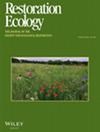在澳大利亚维多利亚州半干旱的马利地区,将原地发芽与原地直接播种联系起来,开展景观规模的恢复工作
IF 2.7
3区 环境科学与生态学
Q2 ECOLOGY
引用次数: 0
摘要
直接播种在干旱地区重新植被方面具有很大潜力,但由于发芽率和出苗率下降,成功率受到限制。通过了解这些项目所用物种的发芽生物学特性和要求,可以提高直接播种的成功率。这项研究调查了维多利亚州马利生态系统中四种半干旱物种的发芽温度和水分要求,以了解它们的发芽生物学特性如何为未来的种植策略提供建议。通过在三种不同条件下培育种子,分析了温度对萌芽的影响:温度分别为 30/20、25/15 和 17/7°C。通过使用聚乙二醇 8000 溶液沿水势梯度催芽,确定了种子对水分的需求。结果显示,研究物种采用了三种不同的策略:(1)相思(Acacia ligulata)采用通才策略,在所有温度下都能很好地萌发,对水胁迫有一定的耐受性;(2)桉树(Eucalyptus calycongona)和白千层(Melaleuca lanceolata)在较高的萌发温度下迅速萌发,对水胁迫的耐受性一般较高;而(3)鹅掌楸(Callitris gracilis)在炎热或干燥的条件下萌发能力较差,只能在较凉爽和潮湿的条件下萌发。根据我们的研究结果,A. ligulata是最适用于直接播种工作的物种,因为它具有普遍的发芽习性。Callitris gracilis似乎在凉爽潮湿的环境中种植效果较好,该物种喜欢在凉爽潮湿的环境中发芽,但不耐受温暖天气的种植。根据发芽要求,混合物种的理想种植时间是中秋,因为此时的温度和湿度水平最适合发芽。本文章由计算机程序翻译,如有差异,请以英文原文为准。
Linking ex situ germination to in situ direct seeding for landscape scale restoration efforts in the semiarid Mallee region of Victoria, Australia
Direct seeding has high potential for arid revegetation, but success is limited by decreased germination and seedling emergence. Direct seeding success may be improved through developing an understanding of the germination biology and requirements of species used for these projects. This study looked into the germination temperature and moisture requirements of four semiarid species from Victoria's Mallee ecosystems to understand how their germination biology may advise strategies for future plantings. Temperature's effect on germination was analyzed by incubating the seeds under three different regimes: 30/20, 25/15, and 17/7°C. Moisture requirements were determined by germinating seeds along a water potential gradient created using polyethylene glycol 8000 solutions. Results showed three different strategies employed by the study species: (1) Acacia ligulata has a generalist approach, germinating well in all temperatures with a reasonable tolerance to water stress; (2) Eucalyptus calycongona and Melaleuca lanceolata germinate rapidly under higher germination temperatures and have generally higher water stress tolerance; while (3) Callitris gracilis germinates poorly in hot or dry conditions restricting germination to cooler and wetter conditions. Based on our results, A. ligulata would be the most widely applicable species for direct seeding work based on generalist germination habits. Callitris gracilis appears to do well if planted in cool, wet conditions where the species prefers to germinate but would be intolerant to warm‐weather planting. The ideal planting time for a mixed species planting based on germination requirements would be mid‐autumn, as that is when temperature and moisture levels would be optimal for germination.
求助全文
通过发布文献求助,成功后即可免费获取论文全文。
去求助
来源期刊

Restoration Ecology
环境科学-生态学
CiteScore
6.50
自引率
15.60%
发文量
226
审稿时长
12-24 weeks
期刊介绍:
Restoration Ecology fosters the exchange of ideas among the many disciplines involved with ecological restoration. Addressing global concerns and communicating them to the international research community and restoration practitioners, the journal is at the forefront of a vital new direction in science, ecology, and policy. Original papers describe experimental, observational, and theoretical studies on terrestrial, marine, and freshwater systems, and are considered without taxonomic bias. Contributions span the natural sciences, including ecological and biological aspects, as well as the restoration of soil, air and water when set in an ecological context; and the social sciences, including cultural, philosophical, political, educational, economic and historical aspects. Edited by a distinguished panel, the journal continues to be a major conduit for researchers to publish their findings in the fight to not only halt ecological damage, but also to ultimately reverse it.
 求助内容:
求助内容: 应助结果提醒方式:
应助结果提醒方式:


